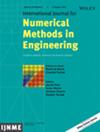A Unified Algorithm Framework for Phase-Field Based Multimaterial Topology Optimization With Various Graded Interfaces
Abstract
In this work, we present a unified algorithm framework for multimaterial topology optimization with various graded interfaces based on the phase field method. In the framework, the topology optimization problem is transformed into solving a set of linear partial differential equations (PDEs). We then introduce a scalar variable to grade the material property, resulting in a complex nonlinear interpolation operator in the effective elastic tensor. Following that, we define an auxiliary variable to substitute all the nonlinear transformations for a linear elliptic equation system. A second-order accurate Crank–Nicolson scheme is applied on the reformulated system, in which all high-order nonlinear terms are treated in a semi-explicit fashion. We prove that the proposed algorithm framework is unconditionally energy stable and demonstrate its stability as well as accuracy by numerical examples. A series of benchmark problems with different interfacial behaviors in topological design are investigated to verify the effectiveness of our method. The sensitivity of different parameters in the model is analyzed to evaluate their effects on the resulting structure.

 求助内容:
求助内容: 应助结果提醒方式:
应助结果提醒方式:


